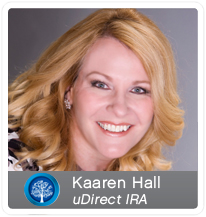Self-Directed IRA Review & Update
By Kaaren Hall, President/CEO, uDirect IRA Services
Trillions of dollars are stored away in retirement plans in the United States and investors are investing billions of those dollars into real estate using Self-Directed IRAs.
The Self-Directed IRA is like any other IRA. The only real difference is the kinds of assets the IRA is allowed to hold. Investors love the ability to pull their retirement funds out of Wall Street and into Main Street where they now control their own investments.
Just like typical IRAs, Self-Directed IRAs come in a few flavors. There’s the Traditional, Roth, SEP, SIMPLE, Inherited and Spousal IRA. So, an IRA is an IRA. They can all be self-directed.
The kinds of alternative assets people invest in include buying houses, investing in syndications (where several people pool their funds to invest), precious metals, performing and non-performing notes, car paper, and trust deeds. Your IRA can be the bank and lend money to people.
One thing to watch out for with a Self-Directed IRA is what’s called “Prohibited Transactions”. For the most part these can be broken down into three categories:
- No personal benefit (present benefit, indirect benefit)
- No buying or selling assets between the IRA and disallowed persons
- Disallowed persons can’t offer goods, services or facilities to the plan.
If you are the sort of person (like me) who likes to read the rules, you can read about prohibited transactions in the Internal Revenue Code 4975. There is a shorter version of IRA rules that can be found at www.IRS.gov Pub 590 (now divided into Part A and Part B). The IRS publications are easily readable and have a lot of helpful information.
So who’s allowed and who’s disallowed to an IRA?
Who’s Allowed
Your brothers and sisters
Your spouse’s brothers and sisters
Your spouse’s parents *
Your spouse’s grandparents
Your spouse’s stepchildren
Your grandparent’s spouse, if not your natural grandparent
Your aunts, uncles, and cousins
Who’s Disallowed
You
Your spouse
Your parents and/or your adoptive parents
Your natural grandparents
Your natural children and/or your adopted children
Your stepchildren
The spouse of your natural children
Your grandchildren
Any fiduciary
Any people providing services to your IRA
*May require an attorney opinion letter
Another thing to watch out for with SDIRAs is fraud. You have to keep your eyes open when you invest and realize that risk is part of it. The best way to deal with this is to be pro-active and do your homework. Do an internet search on the people you are investing with. You can find help through various government and private institutions, too, and that information is listed on our website HERE.
Self-directing your IRA is nothing new. You’ve been able to invest your IRA dollars outside the stock market for 40 years! The industry has changed only a little in that time and there are a couple new rules for 2015 that affect all IRAs including SDRIAs.
One rule that came out of tax court says IRA owners are limited to one 60-day rollover between IRAs in a 12-month period across all of their IRA accounts. What that actually means is that you can have your IRA custodian give you your IRA funds personally (they go into your bank account) and if you send the funds back into another retirement account within 60-days you don’t get taxed. It used to be that each IRA had its own 12-month clock. Now there is one clock for all your IRAs combined.
The Supreme Court handed down the second rule. If you have received an IRA because someone passed away, this one is for you. Inherited IRAs are not “retirement accounts”. That means that inherited IRAs are treated like all other inherited assets and your creditors can tap into them.
In 2016 Rev. Proc. 2016-47 was released saying if people miss the 60 days to rollover an IRA there are now exemptions that they can use and for it to still count as a rollover. Now you can submit a self-certification but this is not a waiver by the IRS of the 60-day rollover requirement.
These are the topics you’ll want to bring up with your tax advisor for more information and to learn how these new rules apply to you. Having a good tax advisor on your team is always suggested, especially when you are investing. Having an expert SDIRA provider is always important too (in my humble opinion).
It’s a great view from my desk where I can see so many investors deploying their funds into deals and building their retirement. There is a huge deficit between what Americans have and what they will need to retire. SDIRAs are a creative way to fill that gap. Unlike typical retirement accounts, we don’t take a fee for “assets under management” so you keep more of your returns. We have a low, flat fee per year. We’d love to help you get started at uDirect IRA Services.






